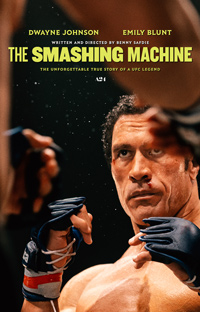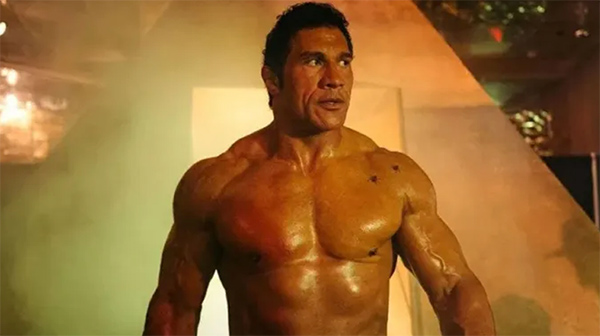Raging Lull: Safdie Pays Homage to a Trailblazer
 The ultimate purpose of The Smashing Machine, the latest film from Benny Safdie, is to give credit where credit is due, paying tribute to mixed martial artist and UFC fighter Mark Kerr, an originator of the sport who was a legend in his arena during a career spanning thirty years. Those ignorant to this world will assume they’ll be witnessing the ascension of someone like a real-life Rocky, triumphant at the finish line despite formidable odds. In essence, Safdie is playing with expectations, including with the parameters of the sports biopic, side stepping cliches for as long as possible. But this isn’t a tale about glorious victory, instead focusing on three specific years of its subject during a transformative period in his career defined by considerable personal crises. A well-performed, empathetic portrait of a man on his own personal precipice, this is an examination of sacrifice and disappointment brought to life mostly through the gravitas of Dwayne Johnson, tapping into his own roots as a spectacle headliner evolving with his circumstances.
The ultimate purpose of The Smashing Machine, the latest film from Benny Safdie, is to give credit where credit is due, paying tribute to mixed martial artist and UFC fighter Mark Kerr, an originator of the sport who was a legend in his arena during a career spanning thirty years. Those ignorant to this world will assume they’ll be witnessing the ascension of someone like a real-life Rocky, triumphant at the finish line despite formidable odds. In essence, Safdie is playing with expectations, including with the parameters of the sports biopic, side stepping cliches for as long as possible. But this isn’t a tale about glorious victory, instead focusing on three specific years of its subject during a transformative period in his career defined by considerable personal crises. A well-performed, empathetic portrait of a man on his own personal precipice, this is an examination of sacrifice and disappointment brought to life mostly through the gravitas of Dwayne Johnson, tapping into his own roots as a spectacle headliner evolving with his circumstances.

Mark Kerr entered the world of freestyle wrestling as a young man at a Brazil tournament in 1977 where he wiped out the competition, relaying his memories of feeling ‘like a god’ to a journalist prior to his latest match in 1997. His girlfriend Dawn (Emily Blunt), with whom he lives in Phoenix, AZ, is supportive of his career but always feels as if she’d kept at a distance from it in favor of Mark’s old trainer and friend, Mark Coleman (Ryan Bader). However, Mark is also addicted to opioids, which has begun to put a strain on his career and his relationship. Just before entering the ring in Tokyo, where he regularly competes in a fighting championship promoted by a company called PRIDE, a bitter argument between Dawn and Mark knocks him off his game, leading to the first loss of his career. Back home, an overdose sends Mark to rehab. While the couple tries to navigate the new reality of his sobriety, Mark must contend with the possibility of going toe-to-toe with his best friend at the next PRIDE event.
Not unlike Sean Durkin’s A24 drama The Iron Claw (2023), which excels as dysfunctional family drama whose characters are defined by a specific sport with which they have developed unhealthy boundaries, Benny Safdie’s first solo directorial effort works best when the focal point is outside the ring. His script avoids some specific details which would assist in orienting the relationship between Mark and Dawn, written as if they had only recently moved in together. While this does assist with establishing some ambiguity about how they’re both to blame for what seems to be an increasingly toxic and co-dependent relationship, their individual insecurities and inability to effectively communicate does create an authentic portrait of chaotic instability. But Blunt is often much too coiffed, and we’re not given much detail about her background. For all of the procedural effects in transforming Dwayne Johnson into Kerr, it would have been beneficial to have some energy poured into the details of Dawn, who as presented here is certainly not a woman who’s eating funnel cake at the fair or going out on all-night benders. Still, the volleying between fury and vulnerability in their frequent fighting is handled with aplomb by Blunt and Johnson, reuniting after co-starring in much lighter fare like Jungle Cruise (2021). Still, Raging Bull (1980) this is not.
Safdie’s bid for authenticity hobbles the other major relationship of the film, the friendship between would-be rivals Mark Kerr and Mark Coleman, the latter who is woodenly played by real-life UFC fighter Ryan Bader. It’s not so much Bader not being able to serviceably deliver his dialogue, but there’s no life behind his eyes, which forces Johnson to constantly pick up the slack. One of the film’s most emotional moments arrives with Kerr in a hospital bed, his friend confronting him about his drug use. This leads to a stint in rehab, but Safdie doesn’t give us a peek into what Kerr has learned about himself. Bas Rutten, on the other hand, playing a version of himself, is more effective as Kerr’s trainer.
Maceo Bishop’s cinematography often suggests The Smashing Machine is at least attempting to emulate Scorsese, but there’s no great sense of grandeur, even as we drift between Tokyo, Phoenix, Arizona early 2000s Hollywood. Period details are amusing, with Dawn reading a paperback by pulp writer Nevada Barr. But specific soundtrack selections, including Sugar Ray and Rod Stewart playing in the background, or Lil Suzy’s “Take Me in Your Arms” ironically utilized while Mark injects drugs into his forearm, conjure elements of the period. Elvis Presley’s cover of “My Way,” recorded later in a career also hobbled by addiction issues, adds meaningful texture.
Ultimately, The Smashing Machine aims to restore glory to a neglected lynchpin of an arena whose modern day heroes benefit economically from their glory magnified by social media. Mark Kerr’s zenith passed well before he could have taken advantage of such opportunities. We meet the modern day Mark Kerr on a grocery store errand in Scottsdale, Arizona, with Safdie’s loving efforts of recuperation steering us into the end credits. The emotional payoff of the film isn’t so much about triumph, but resilience. And the reality of never knowing how being yourself inspires others, even long after it might seem the opportunity to do so has passed.
Reviewed on September 1st at the 2025 Venice Film Festival (82nd edition) – In Competition. 123 Mins
★★★/☆☆☆☆☆


